PTDC0188-stavrosstam by stavrosstam (via http://flic.kr/p/x4L1ud )

PTDC0188-stavrosstam by stavrosstam (via http://flic.kr/p/x4L1ud )

PTDC0188-stavrosstam by stavrosstam (via http://flic.kr/p/x4L1ud )
“You’re in conversation, every day, with Jacquard and Korsakov, Ada Lovelace, Babbage, Herman Hollerith, Erna Hoover, Alan Turing, John Napier, Heron of Alexandria, al-Jazari, Pingala, Liang Lingzan and all the way back to whoever cut tally marks into the Ishango Bone twenty thousand years ago. These are the spirits you speak to as you enact your shamanistic workings. These are your cunning folk.”
–Warren Ellis,
Cunning Plans

Lightning in the center of a cyclone, taken from ISS
http://space-pics.tumblr.com/
The day I moved to Whidbey Island, WA in 1999, on the road back from Sea Tac, two friends and I were in a car accident that might have killed us under slightly different circumstances. That night, one of them left the radio on when he went to sleep. Whidbey is close enough to the Canadian border that one can pick up CBC 2. Between 12:00am and 4:00am, Monday through Friday, they used to air a program called Brave New Waves dedicated to (seriously) alternative music — underground rock, noise, musique concrète, etc. At midnight, without introduction, they launched into a show about Electronic Voice Phenomena, which, as you may already know, is when voices (of the dead, presumably) are detected in the background hiss of recorded audio. A ten-second clip of what sounded like pure static was played; then another, filtered version of the same clip; then another. Eventually, enough of the white noise was stripped out that a human voice became perceptible. It was shocking. You could clearly make out a little girl saying, “Mama, sono freddo.” Then a woman repeated, in a completely flat voice, “Mama, sono freddo.” Finally, in that same neutral tone, she said, “Mama, I’m cold.” And then the process started over again with more static. This went on for hours. I found it utterly terrifying. I actually felt like I was listening to dead people. Mostly, they complained: “It’s dark”, or “I miss you”, or “Where’s my hat?” By the end, I was lying spread-eagle on the carpet in front of the radio, almost in tears, but unable to turn it off. That’s when Patti Schmidt, the host of Brave New Waves, broke in to say, “Thank you for staying up with me all night, even if you couldn’t help it.”

breaking of the fourth wall by jonathancastellino (via http://flic.kr/p/x3LwK7 )

River Flow 002 by noahbw (via http://flic.kr/p/xkoVqr )

Beata Bieniak
Stationary Traveler - chromogenic print - oplage 250 ex. - 2011
“Kiribati, as a nation faced with a very uncertain future, is calling for a global moratorium on new coal mines. It would be one positive step towards our collective global action against climate change and it is my sincere hope that you and your people would add your positive support in this endeavour”

Netting 🐞 by hx1125 (via https://instagram.com/p/29_duDPhr9/)

Ostrich belief.
#instameetsz7
#streetconeseries
#北上港深齐相聚
#挑夫弟弟Cheuk和花样姐姐们的深圳之旅 by hx1125 (via https://instagram.com/p/4St1G5vhp4/)
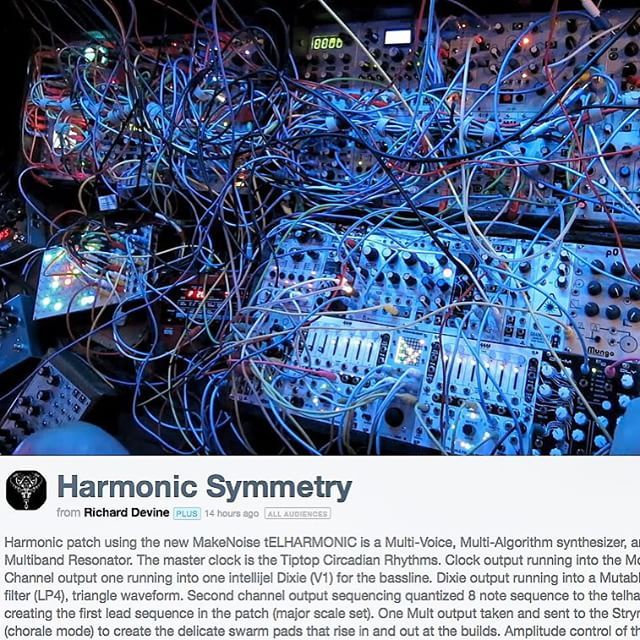
Summer Time patch “Harmonic Symmetry, is here, download the free track in the vimeo link
https://vimeo.com/136165676 by richarddevine (via https://instagram.com/p/6VPGlpjQrc/)

045_0300 (via http://flic.kr/p/xhAhT9 )

045_0299 (via http://flic.kr/p/xhAfWd )
“
What was most concerning was the vehemence with which AI worriers asserted the cause’s priority over other cause areas. For one thing, we have such profound uncertainty about AI — whether general intelligence is even possible, whether intelligence is really all a computer needs to take over society, whether artificial intelligence will have an independent will and agency the way humans do or whether it’ll just remain a tool, what it would mean to develop a “friendly” versus “malevolent” AI — that it’s hard to think of ways to tackle this problem today other than doing more AI research, which itself might increase the likelihood of the very apocalypse this camp frets over. The common response I got to this was, “Yes, sure, but even if there’s a very, very, very small likelihood of us decreasing AI risk, that still trumps global poverty, because infinitesimally increasing the odds that 10^52 people in the future exist saves way more lives than poverty reduction ever could.” The problem is that you could use this logic to defend just about anything. Imagine that a wizard showed up and said, “Humans are about to go extinct unless you give me $10 to cast a magical spell.” Even if you only think there’s a, say, 0.00000000000000001 percent chance that he’s right, you should still, under this reasoning, give him the $10, because the expected value is that you’re saving 10^32 lives. Bostrom calls this scenario “Pascal’s Mugging,” and it’s a huge problem for anyone trying to defend efforts to reduce human risk of extinction to the exclusion of anything else. These arguments give a false sense of statistical precision by slapping probability values on beliefs.
–I spent a weekend at Google talking with nerds about charity. I came away … worried. (viabuzz)
“The vanishing point where scepticism and hope converge”
–Dougald Hine

Vitto Acconci, Virtual Intelligence mask, (1993)
A conventional fencing mask is used as a support structure for electronics; the electronics as a contact with the world outside.
On the front of the mask are three televisions: one larger television facing out and two miniature televisions facing in. The miniature televisions, facing in, cover the eyes of the person wearing the mask; from the outsider’s point of view, the person inside the mask is blindfolded by the two televisions. At one side of the mask is a small portable radio, positioned at the ear of the mask; the radio speaker is directed out.
On the top of the mask are two surveillance cameras, one on top of the other, one directed toward the front, one directed toward the rear. the cameras mechanically rotate side to side.
The person wearing the mask sees his/her environment the two television screens in front of his/her eyes: one screen shows what is going on in front of the person, the other shows whats going on behind.
In the meantime, the larger television and the radio are available for use by passers-by: a passer-by can switch the TV channels, change from one radio station to anotherLiterally “dial” the person wearing the mask. A passer-by can, literally, “turn” the person on.
“I looked down the barrel of the future and saw a dark, empty hole.”
–Roy Scranton,Learning How to Die in the Anthropocene
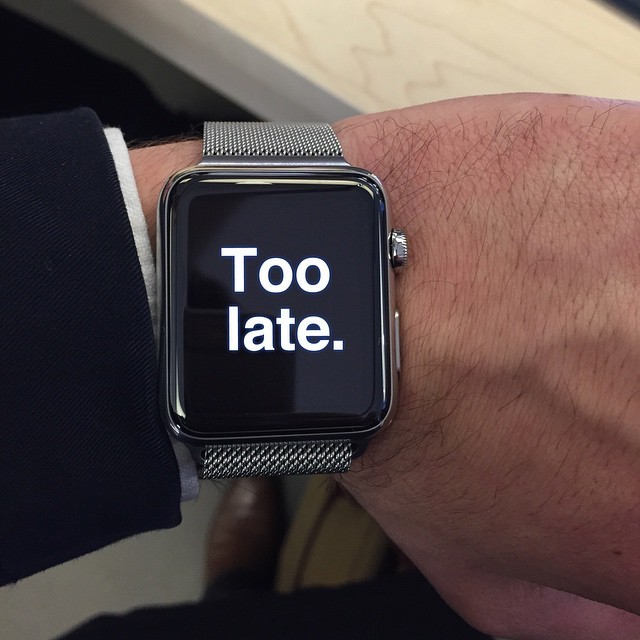

20150801 (via http://flic.kr/p/wYQxF3 )

20150731 (via http://flic.kr/p/xgsAtV )

20150730 (via http://flic.kr/p/wYXxD4 )

20150729 (via http://flic.kr/p/wYXwan )

20150728 (via http://flic.kr/p/wjrbXY )

20150727 (via http://flic.kr/p/wYQF8A )

20150726 (via http://flic.kr/p/xh216M )

045_0285.jpg (via http://flic.kr/p/xfAXds )

045_0291-Edit.jpg (via http://flic.kr/p/wYLwdE )

Mt Wilson Observatory has outstanding peculiar devices. by JulianBleecker (via http://flic.kr/p/wXhLKt )

by kasapidis giorgos (via http://flic.kr/p/wXvtCW )

© Renato D’Agostin by leica_camera (via http://flic.kr/p/wYbjn3 )

Ijen Crater, East Java by Reuben Wu (via http://flic.kr/p/wYFpB4 )
A similar shift in the behavior of the jet stream has also contributed to the California drought and severe polar vortex winters in the Northeast over the past two years. An amplified jet-stream pattern has produced an unusual doldrum off the West Coast that’s persisted for most of the past 18 months. Daniel Swain, a Stanford University meteorologist, has called it the “Ridiculously Resilient Ridge” – weather patterns just aren’t supposed to last this long.
The “Ridiculously Resilient Ridge,” sometimes shortened to “Triple R” or “RRR,” is the nickname given to a persistent region of atmospheric high pressure that occurred over the far northeastern Pacific Ocean during 2013-2014. This anomalous atmospheric feature disrupted the North Pacific storm track during the winters of 2012-2013, 2013-2014, and 2014-2015, resulting in extremely dry and warm conditions in California and along much of the West Coast.[1] [2] The Ridge comprises the western half of atmospheric ridge-trough sequence associated with the highly amplified “North American dipole” pattern, which brought persistent anomalous cold and precipitation to the eastern half of North America[3] during 2014 in addition to record-breaking warmth and drought conditions in California
“A common claim among speculative designers is that our/their designs present new worlds in which people can explore, or even debate, complex issues. But even when speculative interventions are used as a mode of inquiry, little systematic effort is put into assessing (or even asking what it might mean to assess) what participants/audiences get—or take—from design processes or products.”
– Anne Galloway, ‘On Interventionist Speculation’ (2015)
“There’s no future, there’s no past, in the present nothing lasts”
–Lera Lynn


psd:

Great Red Spot closeup
via reddit
“
Corporate Watch fought a 10-month battle to force the government to hand over the information, finally getting a favourable judgment in June. Phil Miller, a researcher with the organisation, said: “It looks like the Home Office is rounding up groups of migrants from particular countries so it can fill a deportation flight, instead of removing people based on their individual immigration cases.”
–Officials deporting migrants by nationality ‘to fill chartered planes’ (viaiamdanw)
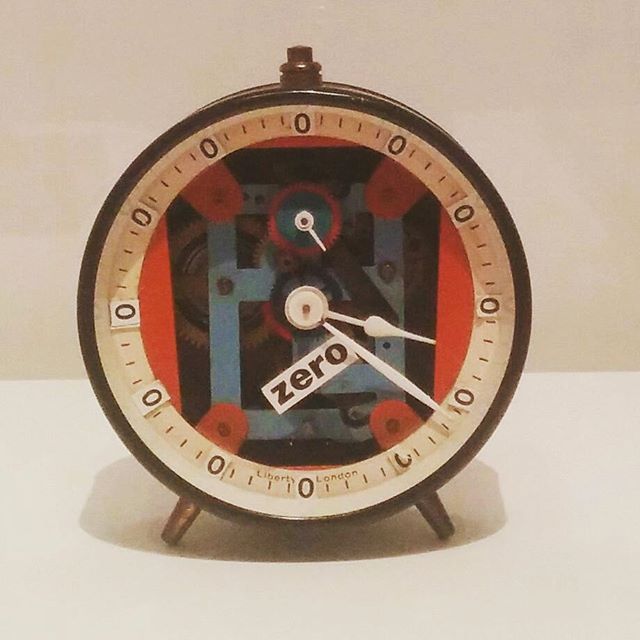
No #time - #Zero #art movement by jaromilrojo (via https://instagram.com/p/6NwXzRG0wV/)

In the not-too-distant past, contacts were stored not in pocket-sized computers but in pocket-sized address books. Our new exhibit gives you a glimpse into the grimy, dog-eared pages of well-known artists’ “little black books.” From Ad Reinhardt’s address book that fits in the palm of your hand, to Holly Solomon’s hulking double rotary Rolodex, these documents help us understand the social networks in which these artists lived and worked.
Little Black Books: Address Books from the Archives of American Art is on view in the Lawrence A. Fleischman Gallery from August 7 - November 1, 2015.
gif from: Ad Reinhardt’s address book, circa 1950-1965. Ad Reinhardt papers, Archives of American Art, Smithsonian Institution.
*Paper. And they, like, mailed stuff. About “art.”

outAISimage00001___2014__week_15 by miska_too (via http://flic.kr/p/x73z8s )

宇宙兄弟 by cry–baby (via http://flic.kr/p/wQkP4d )

#nofilter #ygl #friends #greenland #diskobay by tariqkrim (via https://instagram.com/p/363e6zxgs1/)

Seattle-based photographer Tommy Nease’s work explores surreal and supernatural themes with an illusory aesthetic.
#weirdart #darkart #creepyart #surreal #surrealism #ghost #translucent #horror #supernatural #macabre #Seattle #photography #instaart #instagood #potd #collidemag by collidemag (via https://instagram.com/p/6KsAm-n1Ym/)

by Paul McFarland (via http://flic.kr/p/qBsM7M )

by Paul McFarland (via http://flic.kr/p/pP1c7i )

by Paul McFarland (via http://flic.kr/p/vvfwpd )

Car bonnet/hood by Paul McFarland (via http://flic.kr/p/vgGeC3 )

☾ by ihatemyweaknesses (via http://flic.kr/p/x25tVE )
“In the game of life and evolution there are three players at the table: human beings, nature, and machines. I am firmly on the side of nature. But nature, I suspect, is on the side of the machines. —George Dyson, historian”
– Barrat, James. Our Final Invention: Artificial Intelligence and the End of the Human Era. New York: Thomas Dunne, 2013. (viacarvalhais)

Jodhpur, India is home to more than one million residents, making it the second largest city in the state of Rajasthan. Jodhpur is often referred to as the “Blue City” due to the vivid, painted houses that can be seen throughout its urban area.
Jodhpur
Jodhpur, India
26.29784°N, 73.01842°E
www.dailyoverview.com

TODAY IN HISTORY: A map shows the extent of fire and blast damage to Hiroshima, Japan, by the atomic bomb dropped on August 6, 1945. (WW2DB)

Every economy has to answer two questions: how much to produce and how to distribute that production. Technological advances ensure that each year we can make more stuff with less labor and capital than the year before. This has not changed. What has changed is how we allocate the benefits of progress. Back in the day, workers got the money; today, owners of assets do. Stagnant wages and higher stock prices are two sides of the same coin.
https://lareviewofbooks.org/essay/why-your-rent-is-so-high-and-your-pay-is-so-low-tom-streithorst

L1018688 (via http://flic.kr/p/wKbNwZ )
“It is here that we encounter a deeper kind of laughter than the laughter of absurdity. The laughter of feeling a thing but being unable to grasp it, or of knowing something but of being unable to describe it. These pairs contradict, but they go together.”
–Tim Morton
We have also obtained a glimpse of another crucial idea about languages and program design. This is the thing which I greatly feared is come upon us, desolation and destruction.
“For the University of Ulster’s Roy Sterrit, apoptotic computing is a broad-spectrum defense whose time has come:
We have made the case previously that all computer-based systems should be Apoptotic, especially as we increasingly move into a vast pervasive and ubiquitous environment. This should cover all levels of interaction with technology from data, to services, to agents, to robotics. With recent headline incidents of credit card and personal data losses by organizations and governments to the Sci-Fi nightmare scenarios now being discussed as possible future, programmed death by default becomes a necessity.
We’re rapidly approaching the time when new autonomous computer-based systems and robots should undergo tests, similar to ethical and clinical trials for new drugs, before they can be introduced, the emerging research from Apoptotic Computing and Apoptotic Communications may offer the safe-guard.”
– Barrat, James. Our Final Invention: Artificial Intelligence and the End of the Human Era. New York: Thomas Dunne, 2013. (viacarvalhais)
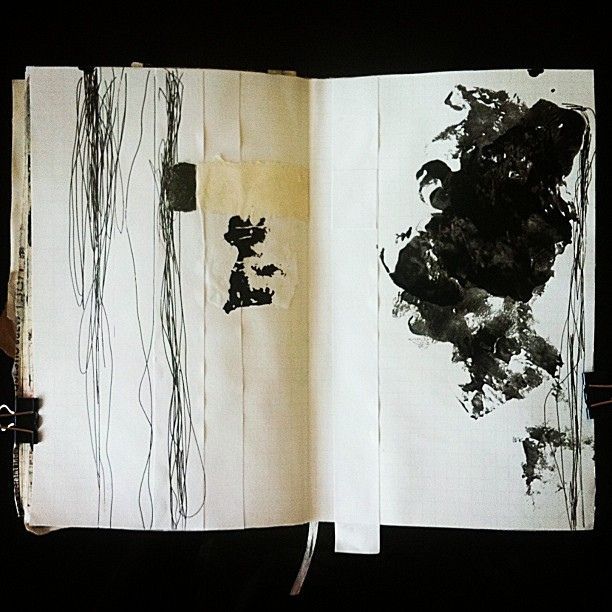
sketchbook - Masha Litvinova
“An amplified jet-stream pattern has produced an unusual doldrum off the West Coast that’s persisted for most of the past 18 months. Daniel Swain, a Stanford University meteorologist, has called it the “Ridiculously Resilient Ridge” — weather patterns just aren’t supposed to last this long.”
–
Eric Holthaus, ‘The point of no return: climate change nightmares are already here’ (2015)
“I think that what has kept the world safe from the bomb since 1945 has not been deterrence, in the sense of fear of specific weapons, so much as it’s been memory. The memory of what happened at Hiroshima.”
“Have you thought that maybe what those people that don’t like you really need is a hug? What are you waiting for?! Fill their hearts with chaos and confusion with a strong, fraternal show of affection.”
–
Contrary to what most scientists themselves appear to believe, science is not a method; it is an approach to knowledge (Stanovich, 2012). Specifically, it is an approach that strives to better approximate the state of nature by reducing errors in inferences. Alternatively, one can conceptualize science as a toolbox of finely honed tools designed to minimize mistakes, especially confirmation bias - the ubiquitous propensity to seek out and selectively interpret evidence consistent with our hypotheses and to deny, dismiss, and distort evidence that does not (Tavris and Aronson, 2007; Lilienfeld, 2010). Not surprisingly, the specific research methods used by psychologists bear scant surface resemblance to those used by chemists, astrophysicists, or molecular biologists. Nevertheless, all of these methods share an overarching commitment to reducing errors in inference and thereby arriving at a more accurate understanding of reality.
http://journal.frontiersin.org/article/10.3389/fpsyg.2015.01100/full
“It is a sad irony, indeed, that those who most need to read it may find The Design of Design entirely incomprehensible. But to anyone who has ever wondered whether using m4 macros to configure autoconf to write a shell script to look for 26 Fortran compilers in order to build a Web browser was a bit of a detour, Brooks offers well-reasoned hope that there can be a better way.”

L1021409 (via http://flic.kr/p/wYxmR3 )

“EPIC maintains a constant view of the fully illuminated Earth as it rotates, providing scientific observations of ozone, vegetation, cloud height and aerosols in the atmosphere. Once EPIC begins regular observations next month, the camera will provide a series of Earth images allowing study of daily variations over the entire globe. About twice a year the camera will capture the moon and Earth together as the orbit of DSCOVR crosses the orbital plane of the moon.”

“In terms of speed and the breadth of material now accessible to anyone in the world, this is really revolutionary,” says audio curator Greg Budney, describing a major milestone just achieved by the Macaulay Library archive at the Cornell Lab of Ornithology. All archived analog recordings in the collection, going back to 1929, have now been digitized and can be heard at www.MacaulayLibrary.org
“This is one of the greatest research and conservation resources at the Cornell Lab,” said Budney. “And through its digitization we’ve swung the doors open on it in a way that wasn’t possible 10 or 20 years ago.”
It took archivists a dozen years to complete the monumental task. The collection contains nearly 150,000 digital audio recordings equaling more than 10 terabytes of data with a total run time of 7,513 hours. About 9,000 species are represented. There’s an emphasis on birds, but the collection also includes sounds of whales, elephants, frogs, primates and more.
“Our audio collection is the largest and the oldest in the world,” explained Macaulay Library director Mike Webster. “Now, it’s also the most accessible. We’re working to improve search functions and create tools people can use to collect recordings and upload them directly to the archive. Our goal is to make the Macaulay Library as useful as possible for the broadest audience possible.”
The recordings are used by researchers studying many questions, as well as by birders trying to fine-tune their sound ID skills. The recordings are also used in museum exhibits, movies and commercial products such as smartphone apps.
“Now that we’ve digitized the previously archived analog recordings, the archival team is focusing on new material from amateur and professional recordists from around the world to really, truly build the collection,” Budney said. “Plus, it’s just plain fun to listen to these sounds. Have you heard the sound of a walrus underwater? It’s an amazing sound.“
Sample some fascinating Macaulay Library sounds:
Earliest recording: Cornell Lab founder Arthur Allen was a pioneer in sound recording. On a spring day in 1929 he recorded this Song Sparrow sounding much as they do today
Youngest bird: This clip from 1966 records the sounds of an Ostrich chick while it is still inside the egg – and the researchers as they watch
Liveliest wake-up call: A dawn chorus in tropical Queensland, Australia is bursting at the seams with warbles, squeals, whistles, booms and hoots
Best candidate to appear on a John Coltrane record: The indri, a lemur with a voice that is part moan, part jazz clarinet
Most spines tingled: The incomparable voice of a Common Loon on an Adirondacks lake in 1992
Most erratic construction project: the staccato hammering sounds of a walrus under water
Most likely to be mistaken for aliens arriving: Birds-of-paradise make some amazing sounds – here’s the UFO-sound of a Curl-crested Manucode in New Guinea
“There are different reactions to the realization that you lost. The first impulse is to give up. Giving up leads to cynicism, disconnection from social contexts or postponing any action until you“figured things out”. Needless to say this is a dark path. But equally bad is denial of loss. Believing that if you just keep going, the next time you will really show them. It’s just around the corner, just a few more projects away. Just have to try a little harder next time. The longer time passes the more the feeling that it won’t happen keeps creeping up on you. The new projects and ideas seem just a little bit more hollow than the last ones. You should have stopped already a long time ago.”
“There are people out there so heavily specialized in wearable technology that they call shirts with networked devices built into them “wearable shirts.” They’re so deep into their own silo of futurism that they’ve forgotten how shirts work.”
–Warren Ellis
The futch ignores complexity. The futch denies how the internet amplifies existing hierarchies and upholds structural inequality. The futch is every broken promise of every new app or internet service. There’s always demand for more legible future. Futch-peddling is about as noble a profession as astrologer, and one with about as little accountability.
https://medium.com/message/postcards-from-the-futch–595796d8a45d
“Revealing the invisible supports that hold up the world, a chief aim of infrastructuralism, is clearly allied with the feminist project of revealing unpaid and unappreciated labor. (I will resist the temptation to join the current controversy about “wife bonuses” for rich stay-at-home moms!) The infrastructuralist imagination — nice term, by the way — seeks to appreciate all that is essential and off the radar. Without reinforcing a gender binary, the book points to the vast realms of technical history made invisible by the masculinist view of technologies as artifacts that work on matter rather than practices that shape bodies. Technology, as I wrote about one of Google’s more outlandish moves, is womb envy.”
–The Anthropoid Condition, an interview with John Durham Peters (vianataliekane)
A million ruby-throated hummingbirds will consume much more food than one African Elephant, even though both have about the same biomass (3,000kg, or 3.3 US tons). Thus, ants, as a group, may actually consume more resources per year than antarctic krill, even though both may have roughly the same biomass, because ants tend to be smaller, and live in warmer environments. Although there may be about 10-15 times the biomass of termites than cows in the world, studies have suggested that termites might produce almost 30,000 times as much methane per year because of their faster metabolism.

Tracking downunder by europeanspaceagency (via http://flic.kr/p/vXjV2h )
“Economists like to demonstrate the archaic nature of command planning with mind-games like ‘imagine the Soviet Union tried to create Starbucks’. Now, here’s a more intriguing game: imagine if Amazon, Toyota or Boeing tried to create Wikipedia.”
–A review of Paul Mason’s‘Post Capitalism: a Guide to Our Future’by Irvine Welsh

L1021466 (via http://flic.kr/p/vUSX73 )

dead flowers by lars on mars (via http://flic.kr/p/wPbLdx )

CosmoCaixa 2100 exhibit by cs_smith (via http://flic.kr/p/vSZW2A )

55554 by Natan Vance (via http://flic.kr/p/wMN1Xf )

Frigidaire 02. by Syntax One (via http://flic.kr/p/wR7amv )

by (x)99. (via http://flic.kr/p/vTQ59v )

Final #foocamp book reco board by genmon (via http://flic.kr/p/wQj8EC )

Lovecraft’s concern was vast, alien entities who have no knowledge of, or concern for, the human race. Our modern-day concerns are about vast, alien entities who have total, invasive, privacy-destroying knowledge of the minutae of the human race - and still have no concern for us.
http://www.antipope.org/charlie/blog-static/2015/07/ia-ia-google-fthagn.html#more

613996 by Natan Vance (via http://flic.kr/p/vQf5ZK )

BUST RX1R-O6738 by Cyclops Optic (via http://flic.kr/p/wuLgem )

by chenghao lee (via http://flic.kr/p/iPxeYr )

Maps of ways to go. by effixx (via http://flic.kr/p/p8FoWT )

New Worlds / Infinite Universes by effixx (via http://flic.kr/p/ovpKWt )

Got lost in it. There’s music coming. #omrecluse by effixx (via http://flic.kr/p/iTe65f )
The speed and scale of China’s island-building spree have alarmed other countries with interests in the region. China announced in June that the creation of islands — moving sediment from the seafloor to a reef — would soon be completed. “The announcement marks a change in diplomatic tone, and indicates that China has reached its scheduled completion on several land reclamation projects and is now moving into the construction phase,” said Mira Rapp-Hooper, director of the Asia Maritime Transparency Initiative at the Center for Strategic and International Studies, a Washington research group. So far China has built port facilities, military buildings and an airstrip on the islands. The installations bolster China’s foothold in the Spratly Islands, a disputed scattering of reefs and islands in the South China Sea more than 500 miles from the Chinese mainland.

The speed and scale of China’s island-building spree have alarmed other countries with interests in the region. China announced in June that the creation of islands — moving sediment from the seafloor to a reef — would soon be completed. “The announcement marks a change in diplomatic tone, and indicates that China has reached its scheduled completion on several land reclamation projects and is now moving into the construction phase,” said Mira Rapp-Hooper, director of the Asia Maritime Transparency Initiative at the Center for Strategic and International Studies, a Washington research group.
So far China has built port facilities, military buildings and an airstrip on the islands. The installations bolster China’s foothold in the Spratly Islands, a disputed scattering of reefs and islands in the South China Sea more than 500 miles from the Chinese mainland.

MICHELE GABRIELE
“Sweety-Knify”
soil, sugar, resin, silicone, shin guards, taxidermied owl
2015
“Hod Lipson at Cornell University’s Computational Synthesis Lab developed software that derives scientific laws from raw data. By observing a double pendulum swinging, it rediscovered many of Newton’s laws of physics. The “scientist” was a genetic algorithm. It started with crude guesses about the equations governing the pendulum, combined the best parts of those equations, and many generations later output physical laws, such as the conservation of energy.”
– Barrat, James. Our Final Invention: Artificial Intelligence and the End of the Human Era. New York: Thomas Dunne, 2013. (viacarvalhais)
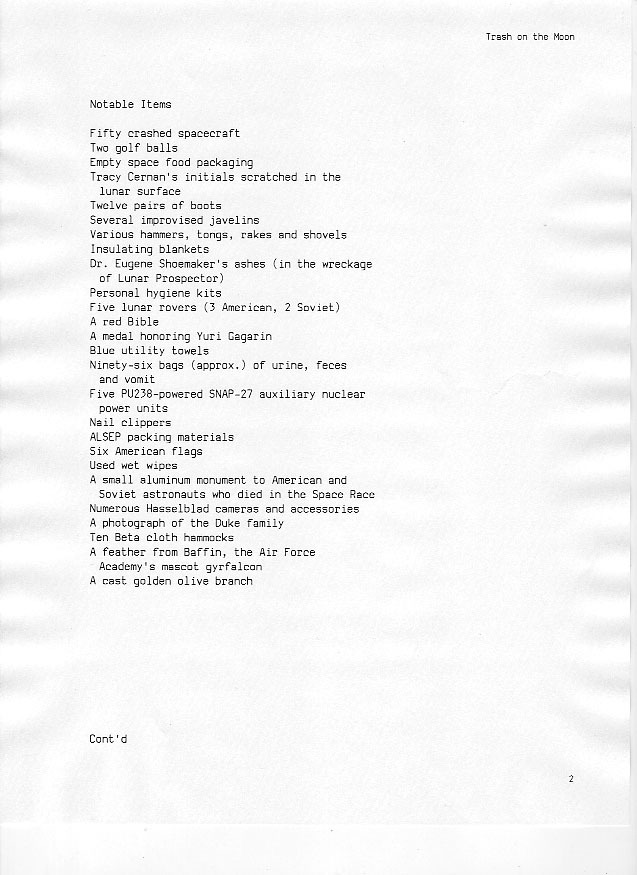

Méditation un rien cosmique by andrefromont/fernandomort (via http://flic.kr/p/pnqtEx )

couronnement sauvage by Laurent Jacques (via http://flic.kr/p/wpjHeu )

0722 by EstherReyes (via http://flic.kr/p/wo19jT )

When someone uploaded the monkey selfies to Wikipedia last year, photographer David Slater took issue. It was his camera, so the copyright fell to him, and Wikimedia Commons should take it down, in his opinion. The whole thing ended when the US Copyright Office issued a public draft stating that works created by animals are public domain. So are any works supposedly created by supernatural beings, just FYI, the Copyright Office added. In other words, this photograph is free to share, reblog, deface, print out on a poster with the words “MISSING” and “REWARD 5,000 bananas” and go out into the jungle to show it around, or do anything else with.
The monkey is a Celebes crested macaque from Indonesia.

“119zc14” by Zach Collins 6x8 inch paper collage on illustration board 2014